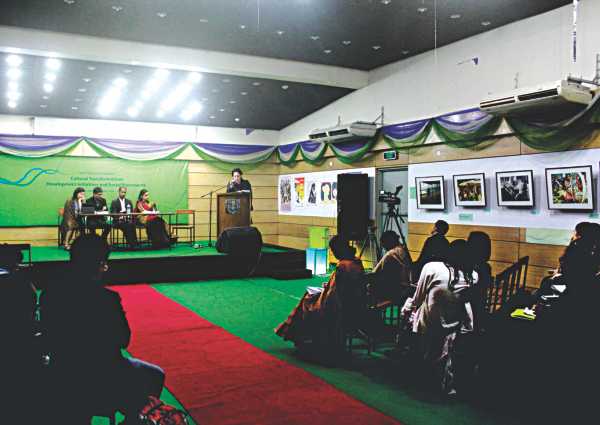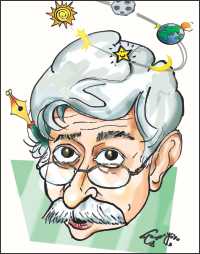Conference
International Conference on Culture: Eclectic and Engaging
Saad Adnan Khan
The idea of 'porous' borders and cultural exchanges no longer seem far-fetched and unattainable. Knowledge is travelling across borders and different societies, for which we are getting alternative academic frameworks and discourses. The conference titled ''Cultural Transformations: Development Initiatives and Social Movements” hosted by the Department of English and Humanities of BRAC University and BRAC Development Institute, took place at BRAC University from December 17-18, 2011. The participants at the conference explored relationship between culture, socio-political and economic changes among Asian countries.

There were more than 80 participants at the conference, with many international speakers from countries like China, Japan, Taiwan, India, Singapore, the United States and Australia. The two day long conference was the biannual conference of the IACSS (Inter-Asian Cultural Studies Society), which is a consortium of universities in South, East and South East Asia. The consortium has been exploring ways of imagining the idea of Asia in the new century, keeping its cultural, political and social histories in view.
“Cultural studies in not constrained by one single discipline. The conference has a wide ranging panel, ranging from cinema to social movements to development,” says Chua Beng Huat, Co-Executive Editor, Inter-Asian Cultural Studies Journal and Professor of Sociology, National University of Singapore.
The keynote addresses were given by Ashish Rajadhyaksha, Senior Fellow, Centre for the Study of Culture and Society (CSCS), Bangalore, India, and Professor Perween Hasan, Vice- Chancellor, Central Women's University, Dhaka. “In Asia generally territorial definitions are hard to sustain. It can be often a deposition from above. The capacity to create boundaries based on ethnic commonalities is not happening,” says Rajadhyaksha.
“We are interested to set postgraduate programmes in cultural studies in each of the universities that took part in the conference. That way we will get a larger academic framework, and not just western discourses. Students from different departments can open up their minds to think in new ways if they attend such conferences,” says Professor Firdous Azim, Chairperson of the Department of English and Humanities, BRAC University.
“Through this conference we wanted to look at the changes and culture, which is not an isolated thing, but it is related to politics, economics and history. Whenever we talk about Asia, we only talk about India and China. We wanted to bring in discourses from East Asia and South East Asia, discourses from countries other than India and China. Bangladesh is now the hotbed of development and transformations, and it is important we look at it critically,” says Seuty Sabur, Assistant Professor Department of Economics and Social Science, BRAC University.
“The conference had so many different panels on music, art, dance, sexuality, feminism and what not. I could relate my academic knowledge to some of the papers due to my knowledge on literary and culture theories. Students from other departments would understand the papers as well, since they were on culture, society and history, things that we all are aware of,” says Sharmin Rahmatullah, Graduate student, Department of English, East West University.
Conferences such as these are bound to draw in scholars and students from different areas of studies. Students need knowledge outside their classrooms and books, and such conferences, with speakers from all around the world, can provide students that opportunity.
DID YOU KNOW?
Muhammed Zafar Iqbal
 Physicist, writer and columnist, Muhammed Zafar Iqbal was born on 23 December 1952 in Sylhet. His father, Foyzur Rahman Ahmed, was a police officer. Because of his father's occupation, he travelled to various parts of the country as a child. Zafar Iqbal was inspired by his father for writing at an early life. He wrote his first science fiction work at the age of seven! On 5 May 1971, the Pakistan Army captured his father and killed him in front of a river. Iqbal had to dig his father's grave to convince his mother of her husband's death. He passed his SSC exam from Bogra Zilla School in 1968 and HSC exam from Dhaka College in 1970. He earned his BSc in physics from Dhaka University in 1976. Then Iqbal went to the University of Washington to obtain his PhD. He earned the degree in 1982. He worked as a post-doctoral researcher at California Institute of Technology (Caltech) from 1983 to 1988. He then joined Bell Communications Research (Bellcore), a separate corporation from the Bell Labs, which is now known as Telcordia Technologies, as a Research Scientist. He left the institute in 1994 and joined the faculty of the Department of Computer Science and Engineering of Shahjalal University of Science and Technology. Physicist, writer and columnist, Muhammed Zafar Iqbal was born on 23 December 1952 in Sylhet. His father, Foyzur Rahman Ahmed, was a police officer. Because of his father's occupation, he travelled to various parts of the country as a child. Zafar Iqbal was inspired by his father for writing at an early life. He wrote his first science fiction work at the age of seven! On 5 May 1971, the Pakistan Army captured his father and killed him in front of a river. Iqbal had to dig his father's grave to convince his mother of her husband's death. He passed his SSC exam from Bogra Zilla School in 1968 and HSC exam from Dhaka College in 1970. He earned his BSc in physics from Dhaka University in 1976. Then Iqbal went to the University of Washington to obtain his PhD. He earned the degree in 1982. He worked as a post-doctoral researcher at California Institute of Technology (Caltech) from 1983 to 1988. He then joined Bell Communications Research (Bellcore), a separate corporation from the Bell Labs, which is now known as Telcordia Technologies, as a Research Scientist. He left the institute in 1994 and joined the faculty of the Department of Computer Science and Engineering of Shahjalal University of Science and Technology.
Information Source: Internet
|
|
|
